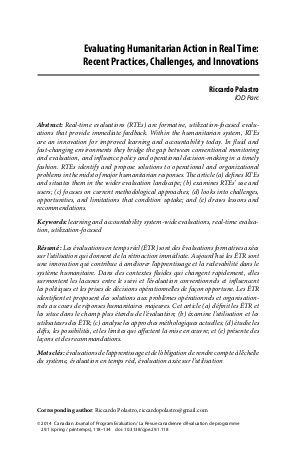
Real-time evaluations (RTEs) are formative, utilization-focused evaluations that provide immediate feedback. Within the humanitarian system, RTEs are an innovation for improved learning and accountability today. In fluid and fast-changing environments they bridge the gap between conventional monitoring and evaluation, and influence policy and operational decision-making in a timely fashion. RTEs identify and propose solutions to operational and organizational problems in the midst of major humanitarian responses.
The article (a) defines RTEs and situates them in the wider evaluation landscape; (b) examines RTEs’ use and users; (c) focuses on current methodological approaches; (d) looks into challenges, opportunities, and limitations that condition uptake; and (e) draws lessons and recommendations.